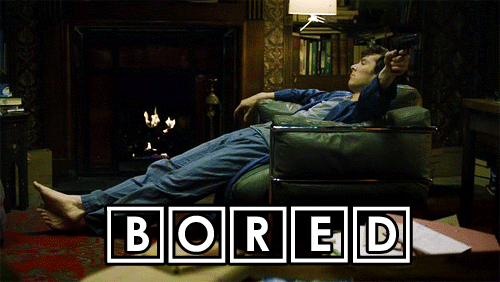Multitasking. How to cope with ghosts outsiders
 Illustration author: John Kenn
Illustration author: John KennMultitasking makes it difficult to concentrate, bring the work started, causes anxiety and fatigue, a constant feeling of haste, a feeling of dissatisfaction, and the efficiency of work decreases.
About multitasking, or rather how to cope with it, the article will be discussed.
What is multitasking
This is the ability, or rather, the inability to cope with several things at the same time and focus on one thing. And although multitasking is considered an effective method of solving problems and a great approach to business - it is not. It will easily add a few working hours at the end of the day and stretch the goal towards months or even years. It would seem that if you take up two cases at once, the time for execution will be reduced by half, but, in fact, time and effort will be needed twice as much, and the chances of success will be halved.
')
How to notice multitasking
Primary action: I deviate from the topic.
At work, we are barely able to work for an hour and not check email, send SMS, call, surf the Internet, get on YouTube or Facebook, tweet something or search Shazam for a great song.
During communication, we barely maintain an hour-long conversation with friends, without using a smartphone.
We always have a lot to do, because life consists of competing demands for attention. We juggle tasks and make a lot of decisions, call back, complete projects, start new ones, take someone somewhere, and take other people from somewhere. At the same time, we manage the household and do not lose our heads. Isn't that cool? Does this prove that we are masters of multitasking almost like Julius Caesar?

We are constantly overwhelmed, trying to fit as many cases as possible in an hour: response to a letter, participation in a conference, checking materials for a meeting. Our diary is already reminiscent of a small novel.
We also have unusual symptoms.
We cannot concentrate on one task for a long time, our thoughts are confused, especially if the matter is boring, time consuming or long. At the same time, transitions from business to business take more and more strength and cause depression and exhaustion. Increasingly we think about the quality of work, but at the same time there are more and more errors. Carelessness is shown and things are lost, ideas are forgotten, meetings are skipped and no replies to letters are sent.
For us, it became the norm during a conversation not to listen to the end of the interlocutor and start to think up an answer or mentally criticize it. And sometimes extraneous thoughts come to mind.
Did I turn off the gas?
 You do not need to focus attention. * vzhuh *
You do not need to focus attention. * vzhuh *
The hidden mechanism of multitasking: the inability to manage attention
The brain is capable of multitasking and does it perfectly. Even at this moment, reading the article, we process what we read, understand the meaning of what is written and create visual images, perhaps even commenting on ourselves. In this case, the heart continues to beat, and the lungs will be filled with air. Our stomach does not cease to function, and the body temperature does not exceed the limits of the norm, we notice sounds and smells.
The brain performs millions of calculations at any given time, and while in the background it is efficient and capable of working with many things at the same time, there will always be one thing in the foreground. What the brain will focus on depends on the task and needs. When reading - an understanding of the chain of characters and meaning written. When we listen to someone - the meaning of what is said. While driving - road conditions.
Imagine yourself in a dark room with a flashlight in your hand. Our attention is a ray of light from a flashlight, we see only what falls under it. Need to look around? To do this, you need to drive a lantern from side to side, but at the same time only that which is lit will be visible.
There are four types of attention management:
- Focusing - a description of the current goal. We see the situation and choose what to look for.
- Hold - concentration on something for a long time. Hold allows you to not disconnect from the achievement of goals and objectives for as long as necessary. However, we do not miss and do not suffer from fatigue or drowsiness.
- Choosing and ignoring is an opportunity to concentrate on one task and not be distracted.
- Switching - action with an abundance of incentives that require attention.
For a long time it was believed that there is a fifth type of effective management of attention - divided attention. This is when a person can work on two or more tasks at the same time.
For example, drive a car and talk on the phone or read a book and listen to music. But later it was discovered that while suffering performance.
By separating attention into two tasks, we begin to make more mistakes and skip something in one task or both.
Split attention - parallel multitasking. At division, attention will be divided between different tasks, and one can get 30% and the other 70%. Fully focusing on one thing will not succeed. This approach will be useful when performing a pair of cases, one of which is performed on the machine. For example, when talking with a friend, walking through the park.
In the case when you need to pay 100% attention to the task being performed, switching will be useful.
Alternate attention, it's switching - serial multitasking. First, we pay all attention to one task, then we switch to another and dive into it with our head. For example, we interrupt conversation, we check mail, we answer messages, and then we continue conversation. It does not seem difficult, but it takes a lot of energy.
Side Effects of Multitasking
In most cases, multitasking is not an enviable skill, but a bad habit. It interferes with concentration and impairs concentration - it becomes difficult to understand the distribution of attention. We become scattered and worse resist distraction. Multitasking beats on efficiency, and between it and trampling on the spot - a thin line.
Multitasking is the enemy of perfection.
It would not be desirable, but, being engaged in several affairs at the same time, it does not turn out to pay attention to details, and the result will suffer from it. You can become a master of all trades, but in a particular case heights will not be achieved. Another effect of multitasking is the loss of the ability to remain focused. The ability to focus on one case for more than five seconds is almost a lost skill.
How to overcome multitasking
We train one-task
TED 2012, Paolo Cardini talks about mono-tasking. Subtitles in Russian.
Paolo Cardini, at TED 2012, proposed an antidote - single-tasking. We want to do something well - we concentrate on the current task. The main thing - to remember about the current goal . Cooking dinner? Then we confine ourselves to cutting, boiling and frying. You should not talk on the phone, listen to TV, order a book of recipes on the saga "Song of ice and flame." We drive? Hands on the steering wheel, feet on the pedals, and a look at the road. Do not touch the navigator, do not read SMS, do not chat with passengers.
Relaxing with friends? Then forget about the important letters, calls, work and flirt with the waitresses.
Of course, if necessary, you can move a little away from mono-tasking: if an excellent thought flashes, we write it down in a notebook and set it aside until free time. So we will not forget it, and the idea has become a side task. Side quests are like a notebook, just not a notebook, into which everything that distracts from the current case is written. The main thing is not to abuse them, otherwise it’s not far from multitasking.
We train the brain
The brain is like a muscle, although not a muscle, and it requires exercises that enable and strengthen cognitive control mechanisms and make them effective.
We notice traps
For most people, the top traps are:
- A television. We will not tell you that this is just a background, and it does not interfere with your business. Turn off the TV.
- The Internet. Now it’s more convenient to search for information than ever, but you don’t have time to look back, and you’ve already hung up on YouTube watching a video about the lemmings migration.
How to cope? We fix side problems, open interesting links in new tabs. Useful information will not disappear, and if it was useless - we forget about the tab and never return to it. - Food. A great example of divided attention is food at work.
But because of this, we eat more than we need, and work less than planned. Plus, work begins to be associated with food, and now we can no longer work without filling our mouths.
Decision? Instead of eating, we drink water. - Business meetings. Yes, the very meetings that became just a reason to get together and chat. Solution - we plan time at the meeting, devote time for entertainment and chatter at the beginning and at the end, and devote the main part to the cause.
To-do lists
The main thing - the list of cases should be like, otherwise we will not return to it. It doesn’t matter where you keep your to-do list - in a notebook or in an app, the main thing is to enjoy it.
If you take the task list, then there will be almost no items that combine several cases. The reason is simple - multitasking is intuitively perceived as meaningless. It is important to develop the habit of keeping a to-do list and regularly checking with it, especially before starting work. The main thing is to work in order of priority of tasks, and if some new one has appeared, we fix it for the future.
Learning to say no
 The boss gave extra work, and a friend asks for help with the project? Or maybe you need help in organizing some kind of event in school with a child?
The boss gave extra work, and a friend asks for help with the project? Or maybe you need help in organizing some kind of event in school with a child?Often we feel obliged to do something for others, although we have enough of our worries. Many people gain a lot of projects from zeal, a sense of duty or a desire to be useful, although they know perfectly well that this is beyond their means.
We must learn to say “no” and discard all worries about other people's projects and affairs, it is still important not to blame ourselves for not being able to help someone.
We delegate authority
The best cure for multitasking is to ask for help. It is difficult and stressful, because having entrusted the work to others, worries can be added. Although it may be unpleasant, it is still worth attracting others. Appeal for help can be considered mutually beneficial cooperation, we helped others when they asked. It is time to pay the bills.
The best exchange of mutual help is just to hire someone.
We train the brain with boredom

Although multitasking provides incentives and energy, and mono-tasking brings yawning and numbness - uninteresting tasks best train the brain. Do not give up a long and tedious business - a great exercise for attention.
On this all multitasking.
I hope that the time you spent on the article gave useful information for reflection.All good, and may the Force be with you!
Read more articles on our blog: SmartTalks
A source:
Source: https://habr.com/ru/post/322158/
All Articles
